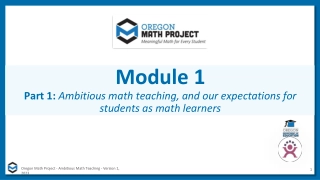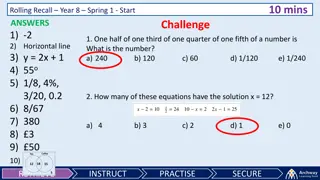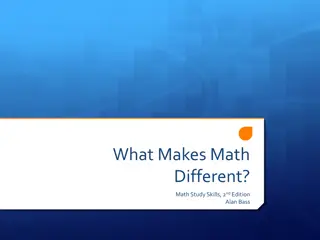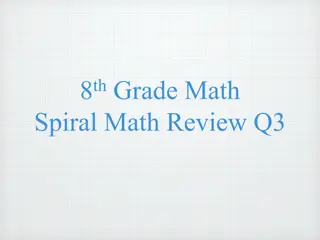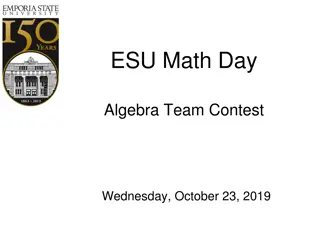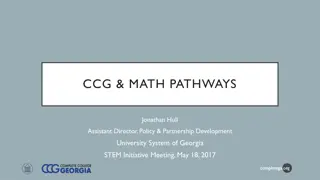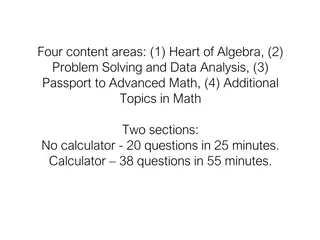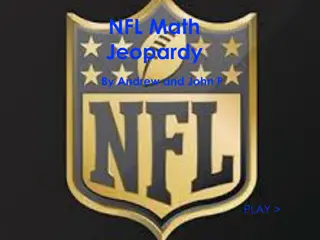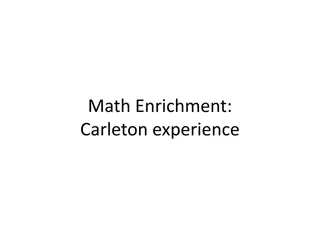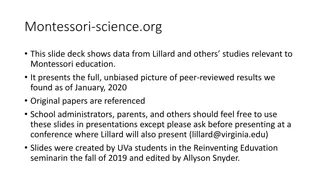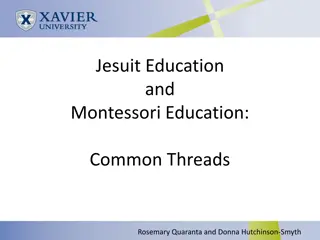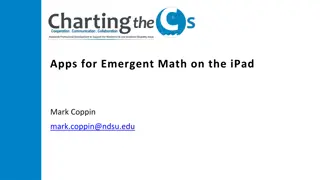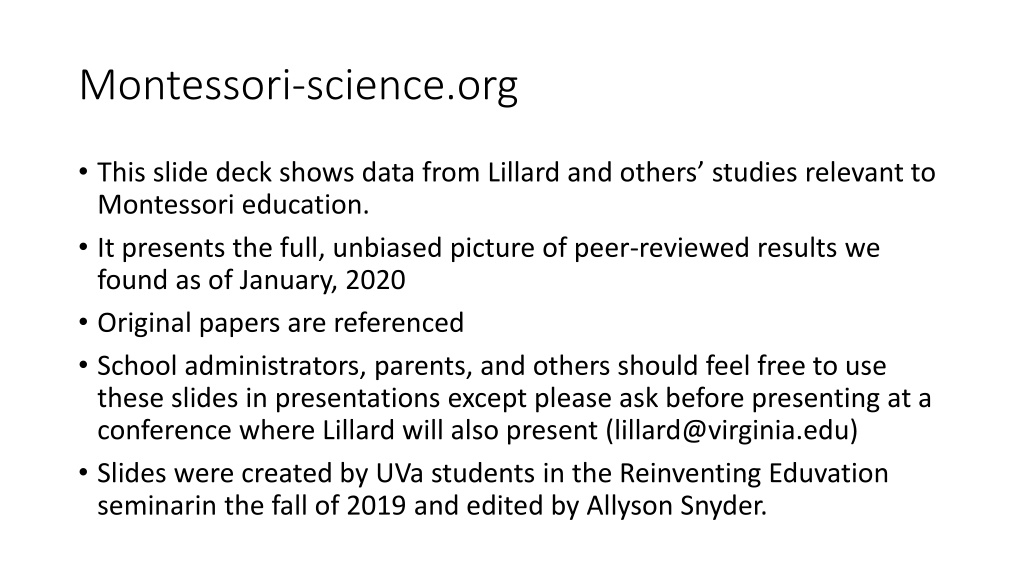
Montessori Education Research Findings 2020
Explore the comprehensive research findings on Montessori education compiled in a slide deck. The studies cover various aspects such as academic achievement, math outcomes, and cognitive development from reputable sources. Dive into the unbiased insights and data from studies by Lillard and others as of January 2020.
Download Presentation

Please find below an Image/Link to download the presentation.
The content on the website is provided AS IS for your information and personal use only. It may not be sold, licensed, or shared on other websites without obtaining consent from the author. If you encounter any issues during the download, it is possible that the publisher has removed the file from their server.
You are allowed to download the files provided on this website for personal or commercial use, subject to the condition that they are used lawfully. All files are the property of their respective owners.
The content on the website is provided AS IS for your information and personal use only. It may not be sold, licensed, or shared on other websites without obtaining consent from the author.
E N D
Presentation Transcript
Montessori-science.org This slide deck shows data from Lillard and others studies relevant to Montessori education. It presents the full, unbiased picture of peer-reviewed results we found as of January, 2020 Original papers are referenced School administrators, parents, and others should feel free to use these slides in presentations except please ask before presenting at a conference where Lillard will also present (lillard@virginia.edu) Slides were created by UVa students in the Reinventing Eduvation seminarin the fall of 2019 and edited by Allyson Snyder.
Math Woodcock-Johnson III Applied Problems * p < 0.05. Bars show standard deviations. Lillard, A. S., Else-Quest, N. (2006). The Early Years: Evaluating Montessori Education. Science, 313, 1893.
Math Change across year--Woodcock Johnson III Applied Problems 5 4.5 4 3.5 3 Convent 2.5 SupMont ClasMont 2 1.5 1 0.5 0 Applied Problems Kruskal-Wallis: 6.37, p < .05 Lillard, A. S. (2012). Preschool children's development in classic Montessori, supplemented Montessori, and conventional programs. Journal of School Psychology, 50, 379-401. 10.1016/j.jsp.2012.01.001.
Academic Achievement 1 Montessori Control 0.8 0.6 0.51 0.4 0.38 0.2 0.21 0.14 0 ** * -0.2 -0.12 -0.21 -0.4 -0.44 -0.45 -0.6 -0.8 -1 Time 0 Time 1 Time 2 Time 3 Latent Growth Curve Modelling: B = 0.13 (SE = 0.067), p < .05 * t(136) = 2.10, p = .04, d = .36 ** t(122) = 2.26, p = .03, d = .41 Lillard, A. S., Heise, M. J., Richey, E. M., Tong, X., Hart, A., & Bray, P. M. (2017). Montessori preschool elevates and equalizes child outcomes: A longitudinal study. Frontiers in Psychology, 8, 1783. doi: 10.3389/fpsyg.2017.01783
Third-Grade Math Outcomes State-Mandated End-of-Grade Tests (EOGs) 0.7 0.6 0.5 0.4 Mean Z 0.3 0.2 0.1 0 Montessori Magnet Bars show standard error. Brown, K., & Lewis, C. W. (2017). A comparison of reading and math achievement for African American third grade students in Montessori and other magnet schools. The Journal of Negro Education, 86, 439 448.
Math Place Value for Larger Numbers The Bean Task (Jones, Thornton & Putt, 1994) 60 * 50 40 Conventional 30 Montessori 20 10 0 Level 1 Level 2 Level 3 Level 4 * p < 0.05 Reed, M. K. (2008). Comparison of the place value understanding of Montessori elementary students. Journal of Cognition and Development, 1(1): 1-26.
Math Iowa Test of Basic Skills (ITBS) First & Second Grade 80 70 60 50 Mean (M) 40 30 20 10 0 Grade 1 Grade 2 Montessori Conventional Bars show standard deviation. Mallett, J. D., & Schroeder, J. L. (2015). Academic achievement outcomes: A comparison of Montessori and non- Montessori public elementary school students. Journal of Elementary Education, 25(1), 39 53.
Texas Assessment of Knowledge and Skills (TAKS) Third, Fourth & Fifth Grade 100 ** ** 90 80 70 60 Mean (M) 50 40 30 20 10 0 Grade 3 Grade 4 Grade 5 Montessori Conventional ** p < 0.01. Bars show standard deviation. Mallett, J. D., & Schroeder, J. L. (2015). Academic achievement outcomes: A comparison of Montessori and non- Montessori public elementary school students. Journal of Elementary Education, 25(1), 39 53.
Math Place Value Test 1 * 0.8 * 0.6 Montessori 0.4 Conventional 0.2 0 Number Ordering Numeral Interpretation Multidigit calculation -0.2 * p < .05. Bars show standard deviation. Mix, K.S., Smith, L.B., Stockton, J.D., Cheng, Y. & Barterian, J.A. (2017). Grounding the symbols for place value: evidence from training and long-term exposure to Base-10 models. Journal of Cognition and Development, 18(1): 129-151.
Math Place Value The School Sale Problem (Bednarz & Janvier, 1982) 0.7 * 0.6 0.5 0.4 0.3 Montessori Conventional 0.2 0.1 0 -0.1 -0.2 * F (1,63) = 4.66, p = .04. Mix, K.S., Smith, L.B., Stockton, J.D., Cheng, Y. & Barterian, J.A. (2017). Grounding the symbols for place value: evidence from training and long-term exposure to Base-10 models. Journal of Cognition and Development, 18(1), 129-151.
Math Number Line Estimation (Siegler & Booth, 2004) 0.3 Montessori Conventional 0.15 0 No significant effect of school type. Bars show standard deviation. Mix, K.S., Smith, L.B., Stockton, J.D., Cheng, Y. & Barterian, J.A. (2017). Grounding the symbols for place value: evidence from training and long-term exposure to Base-10 models. Journal of Cognition and Development, 18(1): 129-151
Math Problem solvingThe Flower Task 140 * 120 100 80 Conventional 60 Montessori 40 20 0 Level 1 Level 2 Level 3 * p < 0.025. Level 1 reflects highest level of understanding. Reed, M. K. (2008). Comparison of the place value understanding of Montessori elementary students. Journal of Cognition and Development, 1(1): 1-26.
Problem Solving Horizontal addition task (Cobb & Wheatley, 1998) 90 ** 80 70 60 50 Conventional 40 Montessori 30 20 10 0 Level 1 Level 2 Level 3 Level 4 ** p <0.01. Level 1 reflects highest level of understanding. Reed, M. K. (2008). Comparison of the place value understanding of Montessori elementary students. Journal of Cognition and Development, 1(1): 1-26.
Problem Solving Vertical addition task 120 100 80 Conventional 60 Montessori 40 20 0 Level 1 Level 2 Level 3 Level 4 Level 5 Level 6 No significant effect of school type. Level 1 reflects highest level-in this case addition problems with stacked numbers. Reed, M. K. (2008). Comparison of the place value understanding of Montessori elementary students. Journal of Cognition and Development, 1(1): 1-26.

